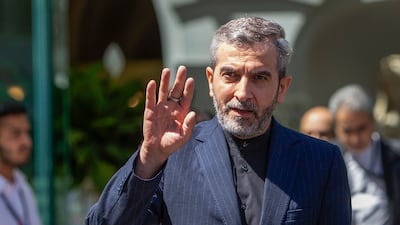Iran has named Ali Bagheri Kani as caretaker foreign minister after the death of Hossein Amirabdollahian in a helicopter crash that also killed President Ebrahim Raisi on Sunday.
Mr Bagheri Kani had served as deputy foreign minister since 2021 and was Iran's lead negotiator in talks leading to the 2015 nuclear deal with global powers, an agreement also known as Joint Comprehensive Plan of Action. He was also involved in negotiating a prisoner exchange with the US in September last year.
His appointment, announced on Monday, is a “positive indication” that Tehran wants to keep open communications with the West, said Mohammad Al Zghool, a researcher on Iran affairs at the Emirates Policy Centre.
“He belongs to the conservative camp but choosing him as foreign minister means Iran wants to keep channels with the US open … we may be seeing more leniency in the new Iranian government towards diplomacy with the West,” Mr Al Zghool told The National.
JCPOA critic
Mr Bagheri Kani was involved in backchannel talks with the US and was scheduled to meet European negotiators in Oman on Wednesday, Mr Al Zghool said.
Mr Bagheri Kani, 56, comes from a politically active and well-connected family in the village of Kan, in north-west Tehran. His father, Bagher Bagheri, was a member of the Assembly of Experts who select the country's supreme leader.
He later became a staunch critic of the JCPOA, which eased sanctions on Iran in exchange for curbs on Tehran's nuclear programme. The deal collapsed when Donald Trump, US president at the time, withdrew his country from it in 2018.
Hardline stance
Speaking at a university in December, Mr Bagheri Kani outlined foreign policy views that only slightly diverged from those of Saeed Jalili, an Iranian hardliner and former nuclear negotiator who firmly opposes any compromise over Iran's nuclear programme.
This forestalls “any chance at a diplomatic breakthrough” during Mr Bagheri Kani's tenure, the United Against a Nuclear Iran pressure group said.
The Mehr news agency quoted Mr Bagheri Khan as saying that “the essence of a professional diplomat lies in leveraging all their strength and capacity to safeguard national interests on the global stage”.
He accused internal critics of Iran's foreign policy of aiming to further their own agendas.
“Attempting to manipulate foreign policy capacities within domestic political agendas constitutes a betrayal of national interests and a pursuit aligned with foreign interests,” Mr Bagheri Khan said.
He was also a high-ranking member of the Iranian judiciary widely involved in political prosecutions, and was a former secretary of Iran's High Council for Human Rights.


